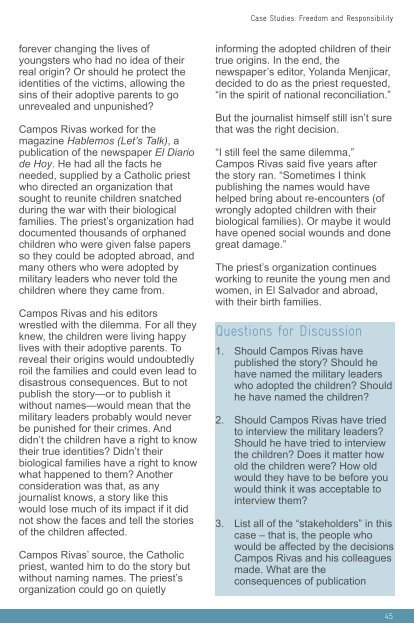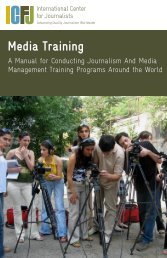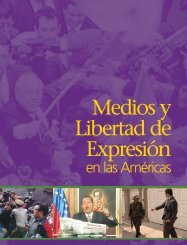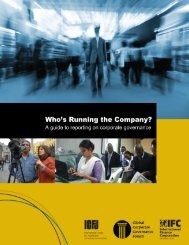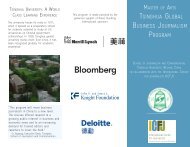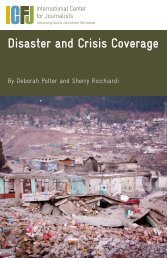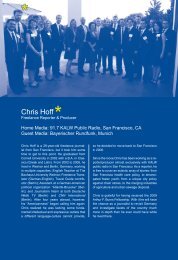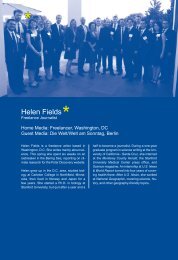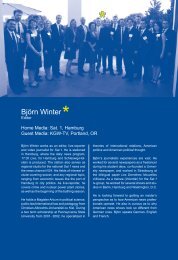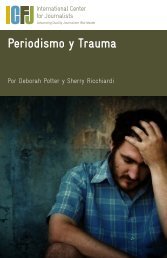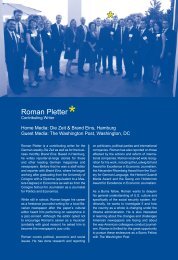Download PDF - International Center for Journalists
Download PDF - International Center for Journalists
Download PDF - International Center for Journalists
Create successful ePaper yourself
Turn your PDF publications into a flip-book with our unique Google optimized e-Paper software.
Case Studies: Freedom and Responsibility<br />
<strong>for</strong>ever changing the lives of<br />
youngsters who had no idea of their<br />
real origin? Or should he protect the<br />
identities of the victims, allowing the<br />
sins of their adoptive parents to go<br />
unrevealed and unpunished?<br />
Campos Rivas worked <strong>for</strong> the<br />
magazine Hablemos (Let’s Talk), a<br />
publication of the newspaper El Diario<br />
de Hoy. He had all the facts he<br />
needed, supplied by a Catholic priest<br />
who directed an organization that<br />
sought to reunite children snatched<br />
during the war with their biological<br />
families. The priest’s organization had<br />
documented thousands of orphaned<br />
children who were given false papers<br />
so they could be adopted abroad, and<br />
many others who were adopted by<br />
military leaders who never told the<br />
children where they came from.<br />
Campos Rivas and his editors<br />
wrestled with the dilemma. For all they<br />
knew, the children were living happy<br />
lives with their adoptive parents. To<br />
reveal their origins would undoubtedly<br />
roil the families and could even lead to<br />
disastrous consequences. But to not<br />
publish the story—or to publish it<br />
without names—would mean that the<br />
military leaders probably would never<br />
be punished <strong>for</strong> their crimes. And<br />
didn’t the children have a right to know<br />
their true identities? Didn’t their<br />
biological families have a right to know<br />
what happened to them? Another<br />
consideration was that, as any<br />
journalist knows, a story like this<br />
would lose much of its impact if it did<br />
not show the faces and tell the stories<br />
of the children affected.<br />
Campos Rivas’ source, the Catholic<br />
priest, wanted him to do the story but<br />
without naming names. The priest’s<br />
organization could go on quietly<br />
in<strong>for</strong>ming the adopted children of their<br />
true origins. In the end, the<br />
newspaper’s editor, Yolanda Menjicar,<br />
decided to do as the priest requested,<br />
“in the spirit of national reconciliation.”<br />
But the journalist himself still isn’t sure<br />
that was the right decision.<br />
“I still feel the same dilemma,”<br />
Campos Rivas said five years after<br />
the story ran. “Sometimes I think<br />
publishing the names would have<br />
helped bring about re-encounters (of<br />
wrongly adopted children with their<br />
biological families). Or maybe it would<br />
have opened social wounds and done<br />
great damage.”<br />
The priest’s organization continues<br />
working to reunite the young men and<br />
women, in El Salvador and abroad,<br />
with their birth families.<br />
Questions <strong>for</strong> Discussion<br />
1. Should Campos Rivas have<br />
published the story? Should he<br />
have named the military leaders<br />
who adopted the children? Should<br />
he have named the children?<br />
2. Should Campos Rivas have tried<br />
to interview the military leaders?<br />
Should he have tried to interview<br />
the children? Does it matter how<br />
old the children were? How old<br />
would they have to be be<strong>for</strong>e you<br />
would think it was acceptable to<br />
interview them?<br />
3. List all of the “stakeholders” in this<br />
case – that is, the people who<br />
would be affected by the decisions<br />
Campos Rivas and his colleagues<br />
made. What are the<br />
consequences of publication<br />
45


